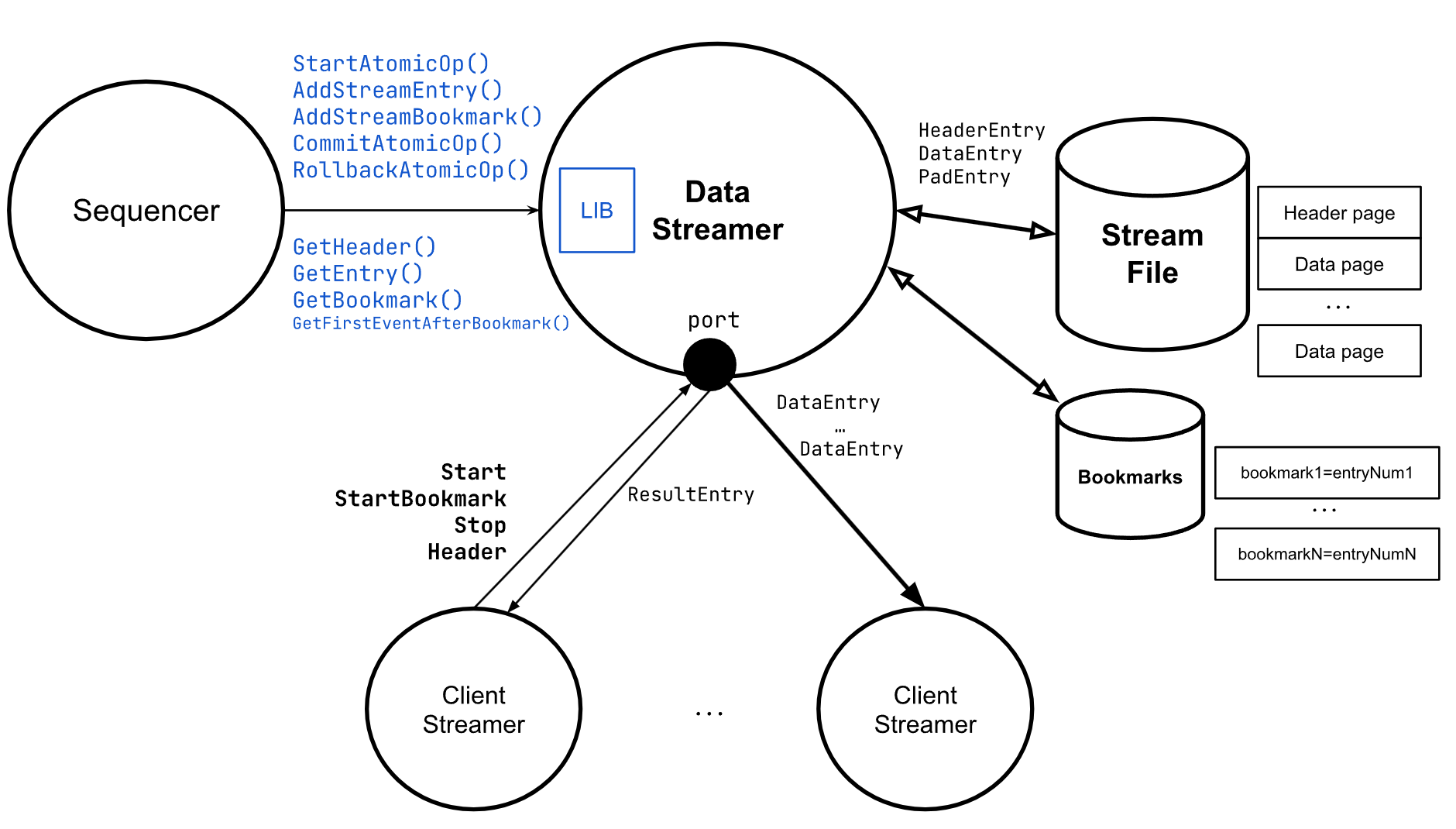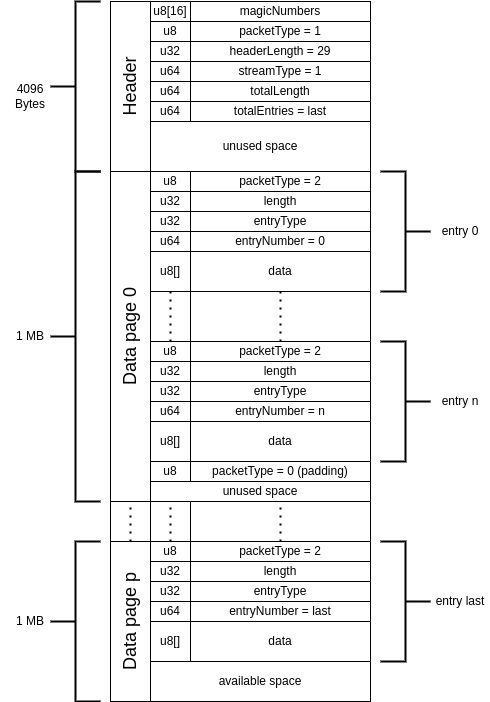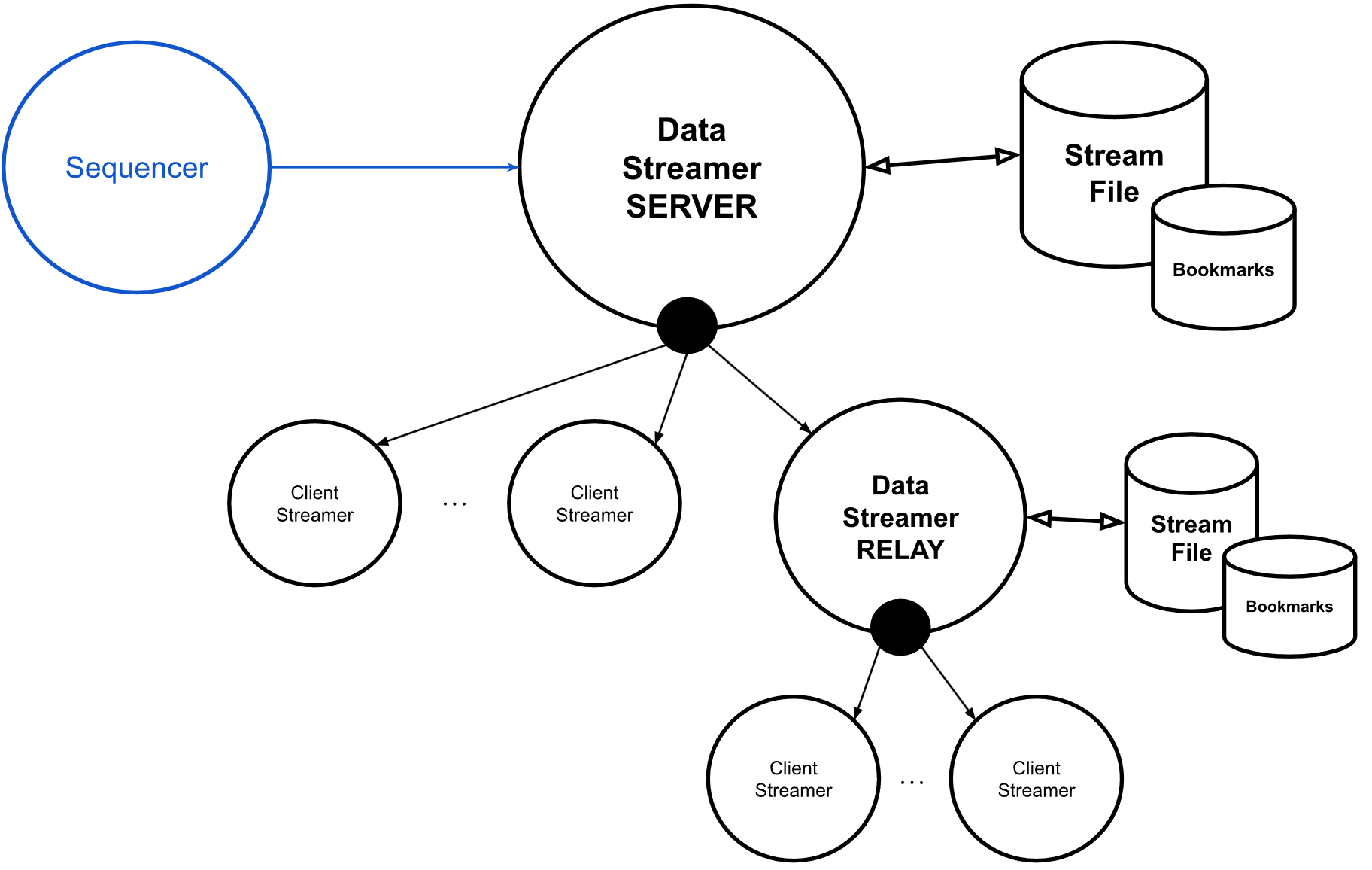Go implementation of a generic fast data streamer library.
Use case for the zkEVM Node: Sequencer data stream service to stream L2 blocks and L2 txs.
Description of the diagram elements:
-
Sequencer: uses the data streamer library through the API to send L2 blocks and L2 transactions to the stream. It's an use case of the datastreamer component.
-
Data Streamer: creates the stream server, it manages the stream file and allows stream clients to connect using a TCP socket. For such stream clients, it offers a series of commands via the TCP port.
-
Stream File: stores all the streaming data. It is a custom binary file organized into data pages with a preceding header page.
-
Bookmarks DB: stores an index for the bookmarks that are available in the streaming file. It uses a LevelDB using the library goleveldb.
-
Streamer Client: creates a stream client, it manages the data streamer connection and allows to execute the TCP commands available in the server.
The binary file format is described below.
- The first page is the header.
- Header page size = 4096 bytes
At the beginning of the file there are the following magic bytes (file signature): polygonDATSTREAM
u8 packetType = 1 // 1:Header
u32 headerLength = 38 // Total length of header entry
u8 Version // Stream file version (starting from 1)
u64 SystemID // E.g.: ChainID
u64 streamType // 1:Sequencer
u64 TotalLength // Total bytes used in the file
u64 TotalEntries // Total number of data entries
- From the second page starts the data pages.
- Page size = 1 MB
u8 packetType // 2:Data entry, 0:Padding
u32 Length // Total length of data entry (17 bytes + length(data))
u32 Type // 0xb0:Bookmark, 1:Event1, 2:Event2,...
u64 Number // Entry number (sequential starting with 0)
u8[] data
NOTE: If an entry does not fit in the remaining page space, the entry will be stored in the next page.
- All the commands available for the stream clients return first a response, a
Resultentry defined in a later section. - Some commands like
StartorHeadermay return more data.
Below is the detail of the available commands:
Syncs from the entry number (fromEntryNumber) and starts receiving data streaming from that entry.
Command format sent by the client:
u64 command = 1
u64 streamType // e.g. 1:Sequencer
u64 fromEntryNumber
If already started terminates the connection.
Syncs from the bookmark (fromBookmark) and starts receiving data streaming from the entry pointed by that bookmark.
Command format sent by the client:
u64 command = 4
u64 streamType // e.g. 1:Sequencer
u32 bookmarkLength // Length of fromBookmark (Max bookmark length value is 16)
u8[] fromBookmark
If already started or bookmarkLength exceeds the maximum length, terminates the connection.
Stops the reception of the streaming transmission.
Command format sent by the client:
u64 command = 2
u64 streamType // e.g. 1:Sequencer
If not started terminates the connection.
Gets the current stream file header (HeaderEntry format defined in the STREAM FILE section), so stream clients can know the total number of entries and the size of the stream file.
Command format sent by the client:
u64 command = 3
u64 streamType // e.g. 1:Sequencer
If streaming already started terminates the connection.
Gets the data from the entry (entryNumber) in the format FileEntry defined in the STREAM FILE section).
Command format sent by the client:
u64 command = 4
u64 streamType // e.g. 1:Sequencer
u64 entryNumber
If streaming already started terminates the connection.
Gets the data from the entry pointed by the bookmark (bookmark) in the format FileEntry defined in the STREAM FILE section).
Command format sent by the client:
u64 command = 5
u64 streamType // e.g. 1:Sequencer
u32 bookmarkLength // Length of bookmark (Max bookmark length value is 16)
u8[] bookmark
If streaming already started or bookmarkLength exceeds the maximum length, terminates the connection.
Remember that all these TCP commands firstly return a response in the following detailed format:
u8 packetType // 0xff:Result
u32 length // Total length of the entry
u32 errorNum // Error code (0:OK)
u8[] errorStr
Bookmarks make possible to the clients to sync the streaming from a business logic point.
- No need to store the latest
stream entry numberreceived. - Using the API, bookmarks to business logic data are added in the send data to stream implementation.
- e.g. zkEVM Sequencer streaming: each L2 block number has its own bookmark. Clients can request to start the stream from a L2 block number.
Stream relay server included in the datastream library allows scaling the number of stream connected clients.
- Data Streamer Relay acts as a
stream clienttowards the main data stream server, and also acts as astream servertowards the stream clients connected to it.
- Create and start a datastream server (
StreamServer) using theNewServerfunction followed by theStartfunction. - Send data to stream by starting an atomic operation through
StartAtomicOp, adding entry events (AddStreamEntry) and bookmarks (AddStreamBookmark), and commit the operationCommitAtomicOp.
- StartAtomicOp()
- AddStreamBookmark(u8[] bookmark) -> returns u64 entryNumber
- AddStreamEntry(u32 entryType, u8[] data) -> returns u64 entryNumber
- CommitAtomicOp()
- RollbackAtomicOp()
- GetHeader() -> returns struct HeaderEntry
- GetEntry(u64 entryNumber) -> returns struct FileEntry
- GetBookmark(u8[] bookmark) -> returns u64 entryNumber
- GetFirstEventAfterBookmark(u8[] bookmark) -> returns struct FileEntry
- GetDataBetweenBookmarks(bookmarkFrom []byte, bookmarkTo []byte) ([]byte, error) -> returns the array of data, ignoring bookmarks, between the given ones
- UpdateEntryData(u64 entryNumber, u32 entryType, u8[] newData)
- Create and start a datastream client (
StreamClient) using theNewClientfunction followed by theStartfunction. - Executes server commands by calling
ExecCommandStart,ExecCommandStartBookmark,ExecCommandGetHeader,ExecCommandGetEntry,ExecCommandGetBookmark, orExecCommandStop.
- ExecCommandStart(fromEntry): Initiates the stream starting from the entry number specified in the parameter.
- ExecCommandStartBookmark(fromBookmark): Initiates the stream starting from the entry pointed by the bookmark specified in the parameter.
- ExecCommandStop(): Stops receiving stream.
- SetProcessEntryFunc(f
ProcessEntryFunc): Sets the callback function for each entry received. Overrides default function that just prints the entry fields.
- ExecCommandGetHeader() -> returns struct HeaderEntry: Fetches stream file header info and returns it.
- ExecCommandGetEntry(fromEntry) -> returns struct FileEntry: Fetches entry data from the specified entry number and returns it.
- ExecCommandGetBookmark(fromBookmark) -> returns struct FileEntry: Fetches entry data pointed by the specified bookmark and returns it.
Build the binary datastream demo app (dsapp):
make build-dsapp
Run the app without parameters to see the available commands:
./dsapp
NAME:
dsapp - Run a datastream server/client/relay demo cli app
USAGE:
dsapp [global options] command [command options] [arguments...]
COMMANDS:
server Run datastream server
client Run datastream client
relay Run datastream relay
help, h Shows a list of commands or help for one command
GLOBAL OPTIONS:
--help, -h show help
Use the help option to check available parameters for the server command:
./dsapp help server
NAME:
dsapp server - Run datastream server
USAGE:
dsapp server [command options] [arguments...]
OPTIONS:
--port value exposed port for clients to connect (default: 6900)
--file value datastream data file name (*.bin) (default: datastream.bin)
--log value log level (debug|info|warn|error) (default: info)
--sleep value initial sleep and sleep between atomic operations in ms (default: 0)
--opers value number of atomic operations (server will terminate after them) (default: 1000000)
--help, -h show help
Run a datastream server with default parameters (port: 6900, file: datastream.bin, log: info):
./dsapp server
Or run a datastream server with custom parameters:
./dsapp server --port 6969 --file seqstream.bin --log warn
Use the help option to check available parameters for the client command:
./dsapp help client
NAME:
dsapp client - Run datastream client
USAGE:
dsapp client [command options] [arguments...]
OPTIONS:
--server value datastream server address to connect (IP:port) (default: 127.0.0.1:6900)
--from value entry number to start the sync/streaming from (latest|0..N) (default: latest)
--frombookmark value bookmark to start the sync/streaming from (0..N) (has preference over --from parameter)
--header query file header information (default: false)
--entry value entry number to query data (0..N)
--bookmark value entry bookmark to query entry data pointed by it (0..N)
--log value log level (debug|info|warn|error) (default: info)
--help, -h show help
Run a datastream client with default parameters (server: 127.0.0.1:6900, from: latest, log: info)
./dsapp client
Or run a datastream client with custom parameters:
./dsapp client --server 127.0.0.1:6969 --from 0 --log debug
Or just get the current stream header file information:
./dsapp client --server 127.0.0.1:6969 --header
Use the help option to check available parameters for the relay command:
./dsapp help relay
NAME:
dsapp relay - Run datastream relay
USAGE:
dsapp relay [command options] [arguments...]
OPTIONS:
--server value datastream server address to connect (IP:port) (default: 127.0.0.1:6900)
--port value exposed port for clients to connect (default: 7900)
--file value relay data file name (*.bin) (default: datarelay.bin)
--log value log level (debug|info|warn|error) (default: info)
--help, -h show help
Run a datastream relay with default parameters (server: 127.0.0.1:6900, port: 7900, file: datarelay.bin, log: info)
./dsapp relay
Sequencer data stream service to stream L2 blocks and L2 txs
List of events (entry types):
uint64 number BatchType type uint64 fork_id uint64 chain_id Debug debug
uint64 number bytes local_exit_root bytes state_root Debug debug
uint64 number uint64 batch_number uint64 timestamp uint32 delta_timestamp uint64 min_timestamp bytes l1_blockhash uint32 l1_infotree_index bytes hash bytes state_root bytes global_exit_root bytes coinbase uint64 block_gas_limit bytes block_info_root Debug debug
uint64 number
uint64 l2block_number uint64 index bool is_valid bytes encoded uint32 effective_gas_price_percentage bytes im_state_root Debug debug
uint64 batch_number uint64 timestamp bytes global_exit_root bytes coinbase uint64 fork_id uint64 chain_id bytes state_root Debug debug
BookmarkType type uint64 value
string message
BOOKMARK_TYPE_UNSPECIFIED = 0; BOOKMARK_TYPE_BATCH = 1; BOOKMARK_TYPE_L2_BLOCK = 2;
ENTRY_TYPE_UNSPECIFIED = 0; ENTRY_TYPE_BATCH_START = 1; ENTRY_TYPE_L2_BLOCK = 2; ENTRY_TYPE_TRANSACTION = 3; ENTRY_TYPE_BATCH_END = 4; ENTRY_TYPE_UPDATE_GER = 5; ENTRY_TYPE_L2_BLOCK_END = 6;
BATCH_TYPE_UNSPECIFIED = 0; BATCH_TYPE_REGULAR = 1; BATCH_TYPE_FORCED = 2; BATCH_TYPE_INJECTED = 3; BATCH_TYPE_INVALID = 4;


